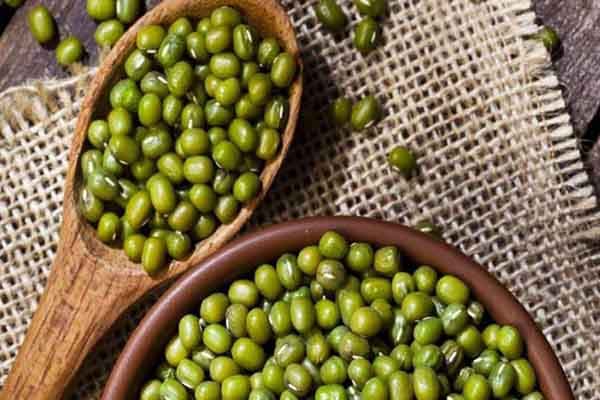Mung Dal
Green gram, also known as mung bean or moong dal, is a popular legume cultivated and consumed extensively in India. Here’s an overview of green gram in India: Green gram is primarily grown in states like Uttar Pradesh, Madhya Pradesh, Rajasthan, Maharashtra, Andhra Pradesh, Karnataka, Tamil Nadu, and Gujarat.
It is cultivated both as a rain-fed and irrigated crop, with different varieties suited to various agro-climatic conditions.There are several varieties of green gram cultivated in India, including Pusa Vishal, Pusa Ratna, ML 818, ML 976, ML 267, etc. These varieties differ in characteristics such as yield potential, resistance to diseases, and adaptability to different environmental conditions.

BENEFITS OF GREEN GRAM/MUNG BEAN:
The vitamins and minerals in green gram, along with its antioxidant properties, contribute to healthy skin by promoting collagen production, reducing inflammation, and protecting against UV damage. Green gram-based face packs and scrubs are also used in skincare for their exfoliating and moisturizing benefits.
- Due to its high fiber and protein content, green gram can help promote feelings of fullness and satiety, which may aid in weight management by reducing overall calorie intake and preventing overeating.
- Green gram is a good source of various vitamins and minerals, including folate, manganese, magnesium, potassium, phosphorus, iron, and vitamins B1, B2, and B6. These nutrients play essential roles in energy metabolism, immune function, bone health, and nerve function.
- Calories: 212 kcal
- Protein: 14.18 grams
- Total Fat: 0.79 grams
- Saturated Fat: 0.224 grams
- Monounsaturated Fat: 0.122 grams
- Polyunsaturated Fat: 0.306 grams
- Carbohydrates: 38.2 grams
- Dietary Fiber: 15.4 grams
- Sugars: 5.97 grams
- Calcium: 54 mg
- Iron: 4.87 mg
- Magnesium: 97 mg
- Phosphorus: 177 mg
- Potassium: 561 mg
- Sodium: 15 mg
- Zinc: 1.38 mg
- Vitamin C: 2.1 mg
- Thiamin (Vitamin B1): 0.323 mg
- Riboflavin (Vitamin B2): 0.067 mg
- Niacin (Vitamin B3): 1.65 mg
- Vitamin B6: 0.274 mg
- Folate (Vitamin B9): 321 mcg
- Vitamin A: 14 IU
- Vitamin E: 0.05 mg
- Vitamin K: 5.4 mcg
